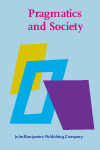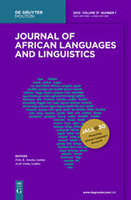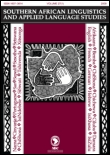
Langages
Scope & Guideline
Fostering Insightful Dialogue in Language Studies
Introduction
Aims and Scopes
- Interdisciplinary Study of Emotions in Language:
A core focus of the journal is the exploration of how emotions are expressed and perceived through various forms of spoken and written language. Research often includes both theoretical frameworks and empirical studies that examine emotional prosody and its implications in communication. - Sociolinguistic Perspectives on Language Use:
The journal frequently publishes studies that analyze language within social contexts, including the impact of social dynamics, identity, and cultural factors on language practices. This includes examining the role of language in various social movements and settings. - Historical and Comparative Linguistics:
'Langages' also addresses historical and comparative aspects of language, exploring how linguistic features evolve over time and across different cultures. This includes studies on diachronic changes in language and their implications for understanding linguistic structures. - Pragmatics and Communication:
The journal emphasizes pragmatic approaches to language, focusing on how meaning is constructed in context. This includes studies on discourse markers, speech acts, and the role of pragmatics in effective communication. - Applied Linguistics and Language Teaching:
Research on language teaching methodologies and the practical application of linguistic theories in educational settings is also a significant aspect of the journal. This includes innovative approaches to language instruction and the role of technology in language education.
Trending and Emerging
- Emotional Prosody and Voice Analysis:
There is an increasing focus on the analysis of emotional prosody in both spoken and sung language. This trend emphasizes the importance of vocal expression in understanding emotional communication, particularly in diverse contexts such as healthcare and education. - Language and Digital Communication:
Research exploring the impact of digital communication on language use and teaching practices is gaining traction. This includes studies on how social media and online interactions shape language and emotional expression. - Sociolinguistics of Health and Well-being:
Emerging themes include the intersection of language and health, particularly how discourse influences perceptions of health and illness. This includes investigations into communication strategies in healthcare settings and the role of language in therapeutic contexts. - Cultural and Political Discourse:
The journal is seeing a rise in studies that analyze language within cultural and political frameworks, especially in relation to social movements and public health. This reflects a broader interest in how language shapes and is shaped by societal issues. - Interdisciplinary Approaches to Language Teaching:
There is a notable trend towards interdisciplinary methodologies in language teaching, integrating insights from psychology, sociology, and technology to enhance language acquisition and teaching effectiveness.
Declining or Waning
- Traditional Linguistic Structures and Theories:
There seems to be a decline in research centered solely on traditional linguistic structures without a strong contextual or applied focus. As the field evolves, there is a noticeable shift towards more interdisciplinary and practical applications of linguistic theory. - General Theoretical Linguistics:
The emphasis on abstract theoretical frameworks without empirical support is less prevalent in recent publications. Scholars are increasingly seeking to ground their theoretical discussions in real-world applications and empirical data. - Static Language Studies:
Research that examines language in a static or isolated manner is becoming less common. There is a growing preference for dynamic studies that consider language as a living, evolving entity influenced by social and contextual factors.
Similar Journals

Argentinian Journal of Applied Linguistics
Bridging the gap between linguistic theory and real-world application.The Argentinian Journal of Applied Linguistics is a prominent publication dedicated to advancing the field of linguistics with a particular focus on practical applications within various contexts. Published by the Federación Argentina de Asociaciones Profesionales de Profesores de Inglés (FAAP), this journal serves as a vital platform for researchers, educators, and linguistics professionals interested in the nuances of language teaching, acquisition, and sociolinguistics. With an ISSN of 2314-3576, the journal showcases original research and reviews that push the boundaries of current knowledge and practice in applied linguistics. Despite being in its early stages, the journal aims to build a strong academic presence by fostering collaboration among scholars and practitioners, thereby contributing to the enhancement of language education in Argentina and beyond. The importance of this journal lies not only in its commitment to accessibility and knowledge dissemination but also in its role as a bridge between linguistic theory and practical application, ultimately benefiting educators and learners alike.

Pragmatics and Society
Fostering Scholarly Dialogue on Language in ContextPragmatics and Society, published by John Benjamins Publishing Co, is an esteemed journal that serves as a vital platform for the interdisciplinary exploration of language use in social contexts. Established with the aim of bridging the gap between pragmatics and social theory, this journal covers innovative research and critical methodologies within linguistics and language studies. With an impressive impact factor and recognition as a Q2 journal in the field of Linguistics and Language for 2023, it ranks notably within the 75th percentile for Arts and Humanities and 73rd for Social Sciences. Based in the Netherlands, Pragmatics and Society is dedicated to fostering scholarly discussions and advancing knowledge in areas such as discourse analysis, sociolinguistics, and communicative practices. Researchers, professionals, and students alike will find this journal to be an invaluable resource for understanding the complexities of language in society and are encouraged to engage with its rigorous publications.

Circulo de Linguistica Aplicada a la Comunicacion
Bridging Research and Practice in Language StudiesCirculo de Linguistica Aplicada a la Comunicacion is a premier open-access journal published by UNIV COMPLUTENSE MADRID, SERVICIO PUBLICACIONES, since 2000, that serves as a vital resource for researchers, professionals, and students in the fields of linguistics and language studies. With an ISSN of 1576-4737, this journal is recognized for its rigorous scholarship and has achieved a notable Q1 quartile ranking in Linguistics and Language as of 2023. The journal's impact extends across diverse domains, holding significant positions in both the Arts and Humanities and Social Sciences categories, ranking #354/1088 and #419/1167 in Scopus, respectively. It features a rich array of research articles that delve into applied linguistics, communication theories, and language pedagogy, creating a comprehensive platform for academic discourse. By fostering collaboration and innovation in language research, Circulo de Linguistica Aplicada a la Comunicacion remains a crucial contributor to the enrichment of knowledge and understanding within the global linguistic community.

International Review of Pragmatics
Connecting Ideas, Bridging Disciplines in PragmaticsInternational Review of Pragmatics is a leading scholarly journal published by BRILL, renowned for its contribution to the fields of Communication, Linguistics and Language, and Psychology. With an ISSN of 1877-3095 and an E-ISSN of 1877-3109, this journal offers a rigorous platform for high-quality research and theoretical contributions that explore the complexities of pragmatics across various domains. Situated in the Netherlands, the journal is currently ranked in the Q2 quartile for both Communication and Linguistics, reflecting its substantial influence and academic excellence. The Scopus rankings further emphasize its importance, with percentile rankings in the 55th to 78th range across several relevant categories. Since its inception in 2014, the journal has consistently pursued the objective of fostering interdisciplinary dialogue and advancing scholarly discourse in pragmatics. Although the journal does not currently offer open access options, it remains committed to accessibility in academia through various channels. Researchers, professionals, and students alike will find valuable insights and contemporary discussions that propel the field forward, making International Review of Pragmatics an essential resource for those dedicated to understanding the intricacies of human communication.

Turkic Languages
Unlocking the Secrets of Turkic Language StructuresTurkic Languages is an esteemed academic journal published by HARRASSOWITZ VERLAG, dedicated to the exploration and analysis of Turkic languages within the broader fields of linguistics and language studies. With an ISSN of 1431-4983, this journal serves as a vital platform for researchers, professionals, and students interested in the intricate structures, dynamics, and cultural contexts of Turkic languages. Although it currently operates without an Open Access option, the journal's commitment to quality research is evident in its placement within the Q4 category of Linguistics and Language for 2023, alongside its Scopus rankings where it stands in the 30th and 26th percentiles for Language and Linguistics across Arts and Humanities and Social Sciences, respectively. The journal's scope encompasses a variety of linguistic phenomena, striving to foster a deeper understanding of Turkic languages and their significance in the global linguistic landscape. With converged years from 2017 to 2022, Turkic Languages continues to uphold its reputation as a crucial resource for advancing scholarship in this specialized field.

RLA-Revista de Linguistica Teorica y Aplicada
Cultivating interdisciplinary insights in the study of language.RLA-Revista de Linguística Teórica y Aplicada, published by Universidad de Concepción, Facultad de Humanidades y Arte, stands as a vital resource in the field of linguistics, delivering cutting-edge research and scholarly articles that contribute to both theoretical and applied linguistics. With its ISSN 0718-4883, this journal aims to foster robust discussions and innovations in linguistic theory, language acquisition, sociolinguistics, and applied linguistics methodologies. Although the journal currently does not provide open access options, it endeavors to reach a diverse audience, including researchers, professionals, and students, who are keen to explore the rich tapestry of language studies. By offering insights from both local and global perspectives, RLA does not only advance linguistic discourse but also encourages interdisciplinary collaboration, thereby solidifying its role as a pivotal publication in the linguistic academic community.

Slovo a Slovesnost
Empowering Linguistic Scholarship for a Global AudienceSlovo a Slovesnost is a prominent academic journal dedicated to the field of linguistics and language studies, published by the Czech Language Institute of the Czech Academy of Sciences. With an ISSN of 0037-7031, the journal has established itself as a significant resource for researchers and professionals within the linguistic community. Its rigorous selection process and impactful contributions have earned it a commendable Q2 ranking in Linguistics and Language as of 2023, as well as Scopus rankings in the 58th percentile for Language and Linguistics. Offering insights into both theoretical and applied linguistics, Slovo a Slovesnost serves as an essential platform for cutting-edge research, fostering dialogue among scholars, and enriching the study of language within the Czech Republic and beyond. Although it does not provide open access, the journal supports a subscription model that ensures high-quality dissemination of knowledge to a dedicated audience of linguists, educators, and linguistic scholars. With coverage converging from 2004 to 2024, it continues to thrive as a vital corner of linguistic scholarship.

Journal of African Languages and Linguistics
Fostering Dialogue on Africa's Linguistic DiversityThe Journal of African Languages and Linguistics, published by DE GRUYTER MOUTON, is a premier academic journal dedicated to the study and analysis of the diverse languages spoken across Africa. With an ISSN of 0167-6164 and an E-ISSN of 1613-3811, this journal has been pivotal since its inception in 1979, engaging readers with rigorous research and scholarly articles that span across critical themes in linguistics and language studies. Based in Germany, the journal holds a distinguished Q2 category ranking in the field of Linguistics and Language, according to the latest 2023 metrics, and features a commendable Scopus ranking, positioning it well within the 56th and 52nd percentiles in its respective categories. Although it currently does not provide open access, it is an essential resource for researchers, professionals, and students alike, striving to deepen their understanding of African languages, their structures, and their sociocultural contexts. With a continuously expanding scope and a commitment to advancing linguistic scholarship, the journal remains a significant platform for fostering academic dialogue and promoting innovative research in African linguistics.

LINGUISTIQUE
Connecting Theory with Practice in LinguisticsLINGUISTIQUE, an esteemed journal published by PRESSES UNIV FRANCE, serves as a vital platform for scholarly discourse in the fields of linguistics and language studies. With its ISSN 0075-966X and E-ISSN 2101-0234, this French journal has been a significant contributor to the understanding of linguistic phenomena since its inception in 2004, and it continues its journey through to 2024. Although currently categorized in the Q4 quartile for both Arts and Humanities (miscellaneous) and Linguistics and Language, its commitment to publishing quality research encourages a diverse range of articles, reviews, and innovative studies. Positioned in the 32nd and 29th percentiles for its respective fields according to Scopus rankings, LINGUISTIQUE is dedicated to advancing knowledge and stimulating engagement among researchers, professionals, and students alike. While it does not offer open access, the journal remains an essential resource for those who seek to deepen their understanding of linguistic principles in a global context, facilitating a richer discourse that connects theory with practice.

Southern African Linguistics and Applied Language Studies
Advancing Linguistic Knowledge in Southern AfricaSouthern African Linguistics and Applied Language Studies is a prestigious journal dedicated to the exploration and analysis of linguistics and applied language studies within the Southern African context. Published by Taylor & Francis Ltd, this esteemed journal has established itself as a significant platform for scholars and practitioners since its inception in 2003. With an impressive Q2 ranking in the Linguistics and Language category and a current Scopus rank of #430 out of 1167, it occupies a vital position in the academic landscape, appealing to a diverse readership keen on linguistic research, language policy, and applied linguistics. While the journal is not currently open access, it provides comprehensive insights and scholarly articles that foster understanding and innovation in linguistic practices and language education. As of 2024, the journal continues to deepen its impact through rigorous peer-review and a commitment to advancing knowledge, making it a key resource for researchers, educators, and students seeking to navigate the complexities of language within the Southern African region and beyond.